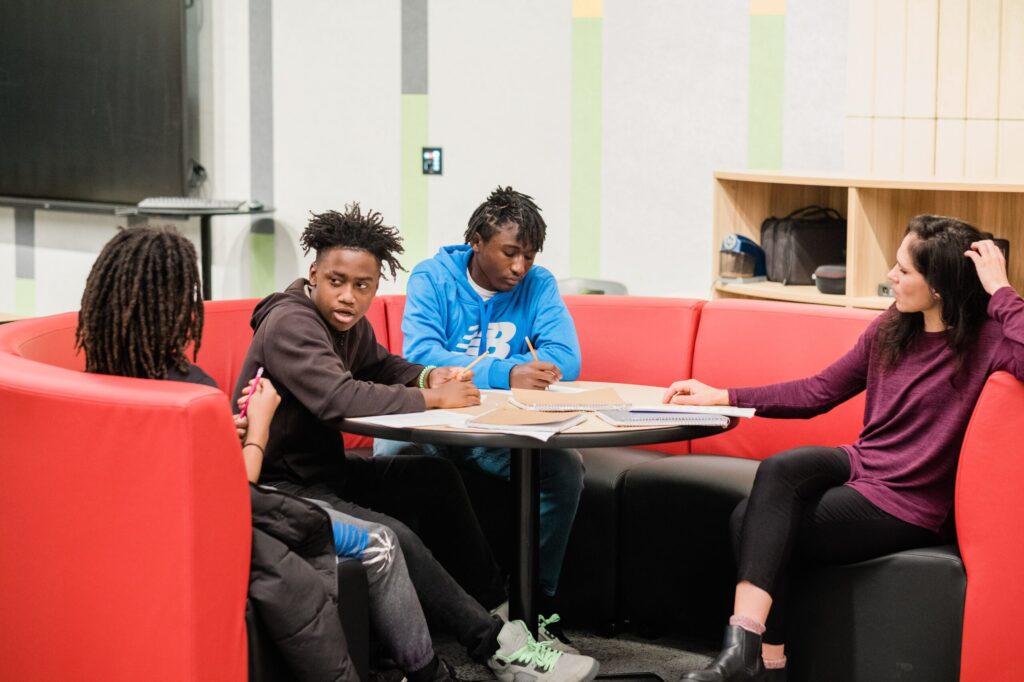Like many members of the Remake Learning network, the folks at The History Co:Lab think a lot about partnership. Their organization brings together a wide range of people thinking about things like learning science and history and museums to think about the future of teaching and learning.
“We describe ourselves as a co-creation lab innovating how students experience learning history, so that they grow up empowered to take on the challenges of today and realize the opportunity tomorrow,” says The History Co:Lab deputy director Sarah Jencks.
The History Co:Lab is now partnering with Remake Learning to envision a robust ecosystem of civic learning in the greater Pittsburgh region. Jencks is organizing a visioning workshop on June 21, and she recently sat down with us to discuss the current state and potential future of civic learning.
Remake Learning: Why does civic learning matter? How does it fit into the mix of what we’re already asking students to learn and educators to teach?
Sarah Jencks: Civics can make everything we learn relevant, compelling and exciting. Young people ask, ‘Why are we learning this?’ The answer to that question is likely to be a civic answer. When students learn history, civic knowledge helps them understand the government and understand the moment in which we live and how we got here. That’s history and civics combined. When students learn about policy related to science, or learn about the arts and free speech, that’s civic learning, too. How do we decide what to regulate? Questions around medicine, questions around AI – these are all civic questions. The science of learning shows us that when learning can be connected to things that kids are already experiencing, they build meaning. They build connections between what they currently know and what’s new. So infusing all learning with civic teaching is an approach based on learning science.
RL: How has civics learning changed over time? These days, what is a typical student’s exposure to civics?
Jencks: A civics class may be offered during middle school, though it may not be a full year. A government class may be offered in high school. But there may be little to nothing offered at the elementary level. So we’re not creating a spiraling curriculum that builds on itself and allows kids to develop civic knowledge in a generative way. That matters, because we know that if kids haven’t been exposed to civic concepts in their elementary experience, then in middle school they lack the context to understand it. The Democratic Knowledge Project at Harvard, and Teacher’s College at Columbia University define civics in four buckets: civic knowledge, civic skills, civic mindsets (or dispositions) and civic actions. You want to teach all four buckets to all children. But that isn’t happening in any widespread way right now. There are some after school programs that teach “action civics,” which links civic knowledge and civic skills to taking action. Unfortunately, that practice has been condemned by conservative school activists who see it as a road too far. In Texas, the legislature just passed a law that kids cannot make contact with their state legislators as part of their schooling. There are people saying, ‘Only civic knowledge is needed.’ My argument is this: If we don’t give kids civic skills and a civic mindset, their knowledge won’t mean much. Knowledge is meaningful when it is contextualized and activated.
RL: What would a robust ecosystem for civic learning look like? What kinds of learning opportunities would students and educators have?
Jencks: In a robust civic learning ecosystem, young people encounter civic concepts, mindsets and skills inside and outside the classroom. Students doing a play in a theater class might learn how the play was received when it was first produced and why the playwright chose to write it. Has it encountered banning or conflict? If so, what were the issues around free speech? Understanding the context in which the play exists allows the learners to come away with a much richer understanding. Another example: Act 35, passed in 2018 by PA’s state legislature, requires an assessment of civic knowledge by eighth grade. But it doesn’t indicate anything about what that assessment needs to look like. In a robust civic learning ecosystem, different kinds of organizations could come together to help schools develop assessments that are locally appropriate and contextualized in the life of southwestern PA and Pittsburgh. This means bringing together people from many different kinds of organizations and also helping them see the civic learning happening in their own work. Anyone working with young people can ask themselves: Where does civics live in my work?
RL: What opportunities do you see in the Pittsburgh region for enriching civics learning?
Jencks: Part of what The History Co:Lab is bringing to our work with Remake Learning is a collaboration with Educating for American Democracy, a bipartisan (they use the term ‘transpartisan’) initiative to develop a roadmap for civic education. Unlike a curriculum, this roadmap for K 12 settings offers concepts as age-appropriate questions for each grade band. There are so many additional possibilities. I’ve been overwhelmed by the number and potential of the organizations we’ve talked to here, including Intermediate Units, social studies folks, folks from the Heinz History Center. We talked to the World Affairs Council about what global civic learning could look like here. The Arts Education Collaborative has an amazing framework for learning that we hope can inform some of our work. SLB Radio and others are doing amazing work on making sure young people have a voice in southwestern PA. Hopefully, shared frameworks for skills and competencies can be adopted across the region to help people across school districts have some common language. A hundred years ago in America, we were educating for personal fulfillment, for citizenship and for job readiness. More and more, we’ve been educating exclusively for job readiness. We need to return to that trifecta.
